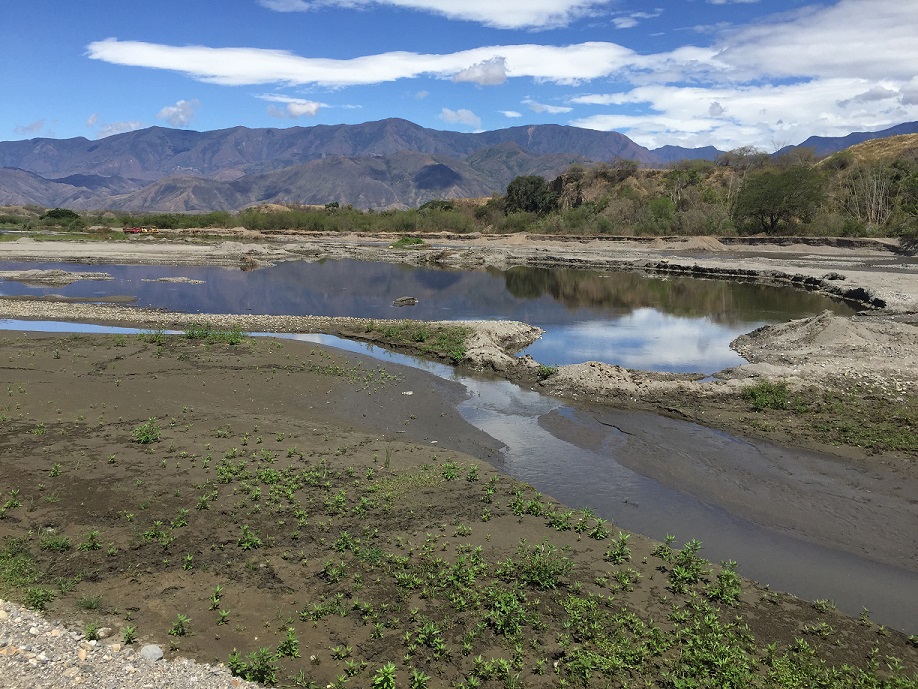Featured image: Afro-Colombian communities along the Patia River plundered by corporate privatization of water sources.
by Mary Louisa Cappelli
Colombia’s infrastructure development projects have led to privatized water grabbing and the marginalization and displacement of many indigenous and Afro-descendent communities living along the Patia River Corridor. Ingeneria de Vias SA (VIAS SA), a private civil engineering company specializing in the execution of urban infrastructure works and water supply networks appears to be directly responsible for a visible pattern of environmental racism in which sand and gravel mining has led to the critical deterioration of wetlands, ecosystems, and, more importantly sustainable livelihoods, along the Patia River.
According to local Galindez spokesman from the Pan Corridor Community Council, “VIAS SA originally received a permit in 2005, but failed to renew it when it expired in 2009.” Since 2009, trucks have been operating nonstop from 4 a.m. to 6 p.m. hauling away 14 square meters of material daily without governmental authorization. For 11 years, VIAS SA has been excavating sand and gravel to be used in the construction of roads and buildings. The excavation of the river has resulted in deterioration of water resources and bed degradation leading to the depletion of water tables, and the devastation of aquatic and riparian watersheds once inhabited by fish, waterfowl and other local species. Galindez spokesman explains, “I was born and I was raised here, and we have never seen this river look like a stream. And they want to continue drying it, just by extracting all these materials, they want to dry the river.”
The river has been a vital source of life for the socio-economic reproduction and traditional livelihoods of Afro-descendent communities. When neoliberal development projects emerged in the mid 1990s along with the sale of Empresa de Energía del Pacífico (ESPA) to an international consortium of Houston Industries, the needs of the local community were subordinated to privatized interests, which instigated unequal power relations and triggered an observable pattern of cultural disruption.
134 families from Galindez, 60 families from Palo Verde, 120 families from El Pilon and 15 families from Hamaca were dependent on the river for their sustainable livelihoods. In the name of development, habitats have been destroyed and families now suffer from food and water insecurity. According to Galindez Spokesman, “In the past, people didn’t have to buy plantains, corn, cassava, and fruits like papaya – but now because we can’t grow our food anymore, we have to work out how to get the money to buy the things we traditionally grew.”
While the Regional Autonomous Corporation of Cauca is supposed to give approval for development projects or projects with environmental impact, community members allege that Ingeneria de Vias SA has been operating outside Article 70, which states: “The State has the obligation to promote and foster access to the culture of all Colombians equally by means of permanent education and scientific, technical, artistic, and professional instruction at all stages of the process of creating the national identity;” Article 72, which states: “Ethnic groups settled in areas of archeological treasures have special rights over that cultural heritage, which rights must be regulated by law;” and Article 246, which provides that “the authorities of the indigenous peoples may exercise jurisdictional functions within their territories, in accordance with their own standards and procedures, provided they do not conflict with the Constitution and laws of the Republic.”
According to the community, they were not consulted about the excavation project and were denied a political voice about the development projects taking place on their ancestral rivers. While some community members are afraid to speak up for fear of physical reprisal, other community members strongly allege that the day-to-day excavation is being protected by paramilitaries who ensure a daily excavation quota. Justicia y Paz spokesperson observed the importance of considering the “role of the police and the role of the army” in the excavation processes. “Because a lot of the money that funds these institutions come from the United States. And in many cases the army and the police have violated the rights of the communities.”
The racialized dispossession of Afro-descendent peoples by privatized water grabbing projects testifies to the privileging of political and international elites, which has led to a trajectory of displacement, deterritorialization, and physical vulnerability. This type of racialized dispossession must be addressed in Colombia’s Post Accords Peace Process and most certainly taken into consideration in the US Congress’s final decision on Obama’s $450 million Peace Colombia Plan— a hefty financial package to support socio-political and environmental justice in the region.
In the words of Afro-Colombian spokesman, he wants the United States to be aware of the water grabbing, as he would like “to get back to a life of dignity.”

